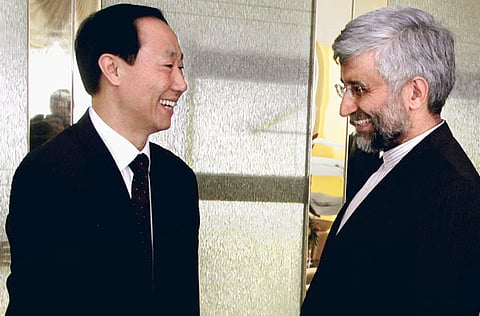US President Obama keeps piling pressure on Iran
US president still believes country is planning to achieve nuclear weapons capability

Beijing: President Barack Obama says the United States will continue to "ratchet up the pressure" on Iran to reveal its nuclear intentions to the rest of the world.
In an interview broadcast yesterday on CBS's The Early Show, Obama said "all the evidence" indicates that Tehran is trying to get a nuclear weapons capacity. With such a capability, Obama said that Iran could "destabilise" life in the Middle East and trigger an arms race in the region.
Obama said, "I think the idea here is to keep on turning up the pressure." He had said earlier last week he wanted new, stronger UN sanctions to be in place by late spring. The president also said he believes the country has become "further isolated" from the rest of the world since he took office.
Meanwhile, Tehran's top nuclear envoy called for negotiations without threat of sanctions, following meetings in Beijing in the wake of US reports saying China had dropped its opposition to possible new UN measures against Iran.
Saeed Jalili sidestepped questions on whether China had confirmed to him that it had changed its opposition to a fourth round of UN sanctions against Tehran for its nuclear programme. He maintained that both Iran and China sought a return to the negotiating table.
Undue pressure
"[Our] Chinese friends all say this problem can only be solved through negotiations and peaceful means. And some big countries should give up their incorrect actions. Pressuring through sanctions will be ineffective," Jalili said.
China has veto power in the UN Security Council, and its support would be key to passing a resolution against Iran.
"Negotiations should be conducted with logic, not with pressure. If negotiations and pressure occur at the same time, there's no way these negotiations can go forward," Jalili said in comments translated from Persian to Chinese.
During his visit to China, Jalili met Foreign Minister Yang Jiechi and Wang Jiarui, who heads the Communist Party's international affairs office.
China has refused to confirm reports that it was willing to consider new sanctions. Foreign Ministry spokesman Qin Gang said on Thursday that Beijing was "concerned about the current situation" but repeated the country's longtime stance of wanting the dispute settled through negotiations.
Obama raised the issue of Iran's nuclear programme when he spoke on the phone for an hour yesterday with his Chinese counterpart Hu Jintao, welcoming his decision to attend a nuclear security summit in Washington in less than two weeks.



